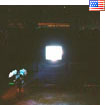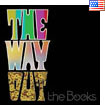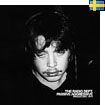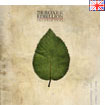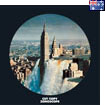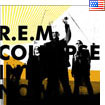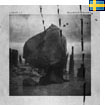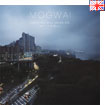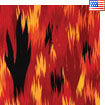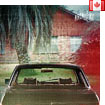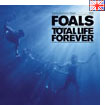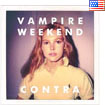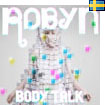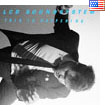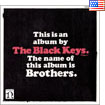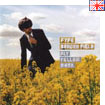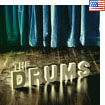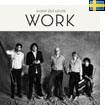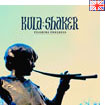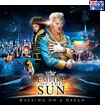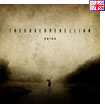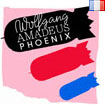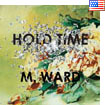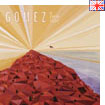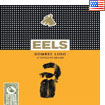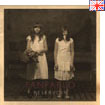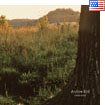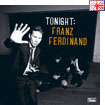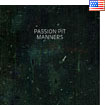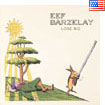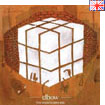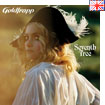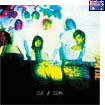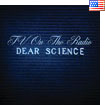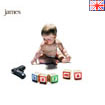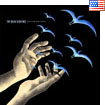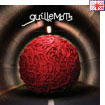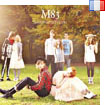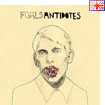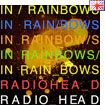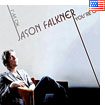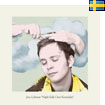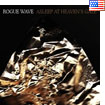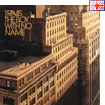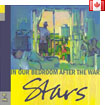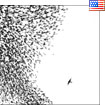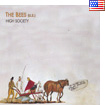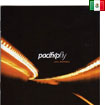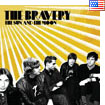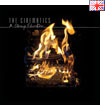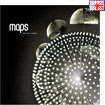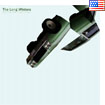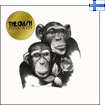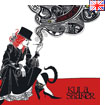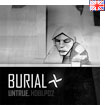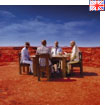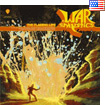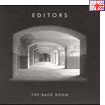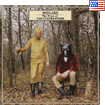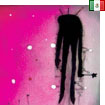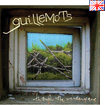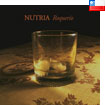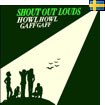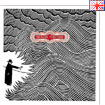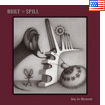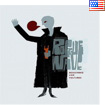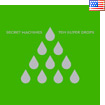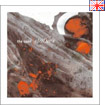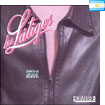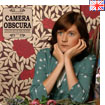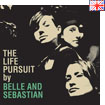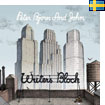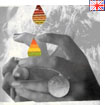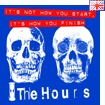 | Ali in the Jungle
These Days
Big Black Hole
See the Light
Back When You Were Good |
| The Hours
It's Not How You Start, It's How You Finish |
Flood (nacido Mark Ellis) es uno de un puñado de productores musicales de los que soy devoto porque parecen incapaces de producir un disco que no me encante. En los noventas, cuando acceso a los créditos seguía siendo parte estándar de la adquisición de un disco, “descubrí” a Flood cuando me di cuenta de que era no sólo el productor o ingeniero principal en varios discos de mis grupos favoritos—U2, Depeche Mode, New Order, Erasure, The Charlatans—pero también en discos que a mí me parecían inusualmente buenos por grupos de los que no me consideraba fan, como Mellon Collie and the Infinite Sadness de Smashing Pumpkins o The Downward Spiral de Nine Inch Nails. (Otras bandas con las que trabajó en los 80s y 90s incluyen PJ Harvey, Nick Cave, Ministry, Nitzer Ebb, The Jesus and Mary Chain, Curve, Cranes, James, The Book of Love, y Inspiral Carpets.) | |
Flood (née Mark Ellis) is one of a handful of music producers I’m devoted to because they seem unable to produce a record I won’t love. In the nineties, when album liner notes were still a standard part of your music purchases, I “discovered” Flood when I noticed that he was not only the main producer or engineer on several albums by my favorite bands—U2, Depeche Mode, New Order, Erasure, The Charlatans—but also on albums that I considered uncharacteristically good by bands I wasn’t really a fan of, like Smashing Pumpkins’ Mellon Collie and the Infinite Sadness or Nine Inch Nails’ The Downward Spiral. (Other bands he worked with in the 80s and 90s include PJ Harvey, Nick Cave, Ministry, Nitzer Ebb, The Jesus and Mary Chain, Curve, Cranes, James, The Book of Love, and Inspiral Carpets.) |
Hoy en día he invertido un poco el proceso, investigando periódicamente en qué andan mis productores favoritos para “descubrir” bandas que probablemente me terminarán gustando. A principios de 2008, por ejemplo, me metí a ver en qué andaba Flood, y vi que había producido Seventh Tree de Goldfrapp y Með suð í eyrum við spilum endalaust de Sigur Rós—dos discos que ya tenía y sabía serían de mis favoritos de ese año. Este verano me metí a investigar de nuevo y vi que había producido Let England Shake de PJ Harvey y Euphoric Heartbreak de Glasvegas—dos discos de los que había escuchado pero no había escuchado—pero por alguna razón me intrigó más un disco llamado It’s Not How You Start, It’s How You Finish, de un grupo que nunca había escuchado mencionar antes: The Hours. | |
Nowadays I’ve reversed the process a bit by “discovering” bands I like by periodically checking in to see what my favorite producers are up to. In early 2008, for example, I checked in to see what Flood had been up to recently, and found out he had produced Goldfrapp’s Seventh Tree and Sigur Rós’s Með suð í eyrum við spilum endalaust—two albums I had recently purchased and already loved. This past summer I decided to check in again and saw he had produced PJ Harvey’s Let England Shake and Glasvegas’ Euphoric Heartbreak—two albums I knew about but hadn’t really gotten around to listen to—but for some reason I was more intrigued by an album called It’s Not How You Start, It’s How You Finish, by a band I’d never heard of before: The Hours. |
Primero pensé que era un ‘álbum debut’, publicado a finales de 2010, pero con Wikipedia tan ubicuo es difícil permanecer en un error por mucho tiempo. Resulta que los dos miembros de la banda son veteranos de la escena independiente británica, habiendo colaborado como músicos o compositores para nada menos que Pulp, Elastica, Joe Strummer and The Mescaleros, Ian Brown, Shaun Ryder, y Josh Homme, entre otros. La banda se formó en 2004, sacó su primer disco en 2006 y un segundo en 2009, pero ambos se distribuyeron únicamente en el Reino Unido. It’s Not How You Start, It’s How You Finish fue su primer disco en Estados Unidos, y contiene canciones de los dos discos británicos; estoy suponiendo que eligieron las mejores canciones de ambos, porque este prácticamente no tiene desperdicio. | |
At first it seemed like this was a ‘debut album’, released at the end of 2010, but with Wikipedia so ubiquitous, it’s hard stay misinformed for long. It turns out the two members of the band are both veterans of the British indie scene, having collaborated as either musicians or songwriters with no less than Pulp, Elastica, Joe Strummer and The Mescaleros, Ian Brown, Shaun Ryder, and Josh Homme, among others. The band itself formed in 2004, released its first album in 2006 and a second in 2009, but both were UK-only releases. It’s Not How You Start, It’s How You Finish was their first US release, and features songs from both of their previous UK-only releases; I’m assuming they picked the best songs off of both albums, because there is very little waste to be found. |
Y aquí es donde, para alguien como yo, escribir una “reseña” se vuelve difícil; se trata no sólo de explicar por qué algo te gusta tanto, sino esperar que tu entusiasmo contagie de algún modo a quien haya cometido el error de ofrecerte un poco de su atención. Es especialmente difícil cuando te das cuenta de el objeto de tu afecto no tiene nada sobresaliente: estudiado por separado, la habilidad musical, la voz del cantante, la producción (¡a pesar de Flood!)... nada excepcionales, diría yo. Escuchado de fondo, no creo que estas canciones capten la atención de alguien. Pero si por alguna razón fortuita llegases a realmente escuchar un poco, u oírlas más de una vez, descubrirías que tienen algo que te hará querer escucharlas de nuevo... Lo cual, creo, es a lo que aspira todo músico. | |
And this is where, for someone like me, writing a “review” gets hard; it’s not only trying to explain why you like something so much, but hoping your enthusiasm will some how rub off on whoever made the mistake of offering a bit of their attention to you. It’s especially difficult when you realize there isn’t anything remarkable about the object of your affection: studied separately, the musicianship, the singer’s voice, the production (Flood notwithstanding!)... not exceptional, I would say. Heard in the background, I’m not sure these songs would capture anyone’s attention. But if for some fortuitous reason you happened to actually listen a little, or hear these songs more than once, you’d find there was something about them that makes you want to listen again... Which, I believe, is what every songwriter aspires to. |
Yo encuentro que estas canciones me hacen sentir bien. Tienen el triple golpe de la meoldía pegajosa, la emoción ascendente, y las letras inspiradoras, que tratan principalmente con levantarte después de haber sido derribado. Según he leído, Antony Genn, el cantante, tuvo problemas de adicciones bastante destructivas a principios de la década pasada, por lo que sabe de lo que está cantando, y se escucha. Imagino que los más cínicos encontrarían las letras algo trilladas, pero no puedo imaginarme a los menos endurecidos entre nosotros no sentirse un poco más vigorizados al cantar, “Como Ludwig Van, cómo amo a ese hombre, se quedó sordó y no le importó” o “Si hubo alguna vez un momento en el que necesitamos unirnos, ese momento es ahora, cuando todo se está derrumbando... No hay tiempo para ensayar, pronto nos habremos ido por siempre... Estos días... Estos días son los únicos que tenemos.” La entrega es emotiva, sin duda, y la música sosteniendo el mensaje es, como sería apropiado, animada e incitante, empalmando instrumentos a medida que progresa cada canción. Adivinaría que Martin Slattery, quien toca la mayoría de los instrumentos, es un tecladista antes que nada: El piano es casi siempre el primer instrumento que se escucha y el que usualmente propulsa las canciones, y (aquí arriesgo perder algunos lectores) tenuemente admitiré que algunas canciones me recordaron a Keane. Que eso no sirva para disuadir a nadie, sin embargo; sólo hay un tema con un nivel comparable de melcocha (“I Miss You”), y la señalaré como el tema más débil del disco. Afortunadamente, sus raíces más bien radicales prevalecen; no olvidemos con quiénes comenzaron sus carreras musicales. | |
I find these songs make me feel good. There is a one-two-three punch of catchy hooks, soaring emotions, and uplifting lyrics, which deal mostly with picking yourself up after being beaten down. From what I’ve read, Antony Genn, the singer, had a pretty difficult bout with drug abuse in the early oughts, so he knows what he’s singing about, and it shows. I suppose the more cynical ones out there might find his lyrics somewhat trite, but I can’t imagine the less hardened among us not feeling a little more invigorated after singing along to, “Like Ludwig Van, how I love that man, well the guy went deaf and didn’t give a damn” or “If there’s ever a time we need to come together, the time is now, when everything’s falling apart... There’s no rehearsal, soon we’ll be gone forever... These days... These days are all we have.” The delivery is spirited, for sure, and the music supporting the message is, appropriately, rousing and anthemic, layering instruments as the songs progress. I would guess Martin Slattery, who plays most of the instruments, is a keyboardist first: The piano is almost always the first instrument you hear, it’s usually the instrument propelling the songs forward, and, at risk of losing some readers here, I will faintly admit that a song or two brought Keane to mind. May that not be a deterrent for anyone, though; they only approach that amount of syrup on one track (“I Miss You”), and I will single it out as the weakest one on the record. Luckily, their edgier roots prevail; let’s not forget who these guys started their musical careers with. |
Así que, las canciones pegajosas y alentadoras, ¿son una rareza? No realmente. Con la temporada de las listas de lo mejor del año avecinándose, yo ya he decidido que este disco encabezará mi lista de “mejores discos comunes y corrientes”. Lo cual me lleva a mi punto original de tratar de venderles a una banda que no es pionera en un sólo aspecto. ¿Qué puedo decir, más allá de que me gusta mucho este disco, y creo que deberían escucharlo? (Y espero que los haga sentir como a mi cuando lo escucho.) | |
So, are catchy, soaring, anthemic songs a rarity? Not really. With the best-of-the-year-lists season approaching fast, I’ve already decided this album will top my “Best Unremarkable Albums” list. Which brings me back to my original point about trying to pitch a band that does not have a single groundbreaking aspect to them. What can I say, other than I really like this record, and I think you should give it a spin? (And hope it’ll make you feel like I do when I sing along to it.) |


